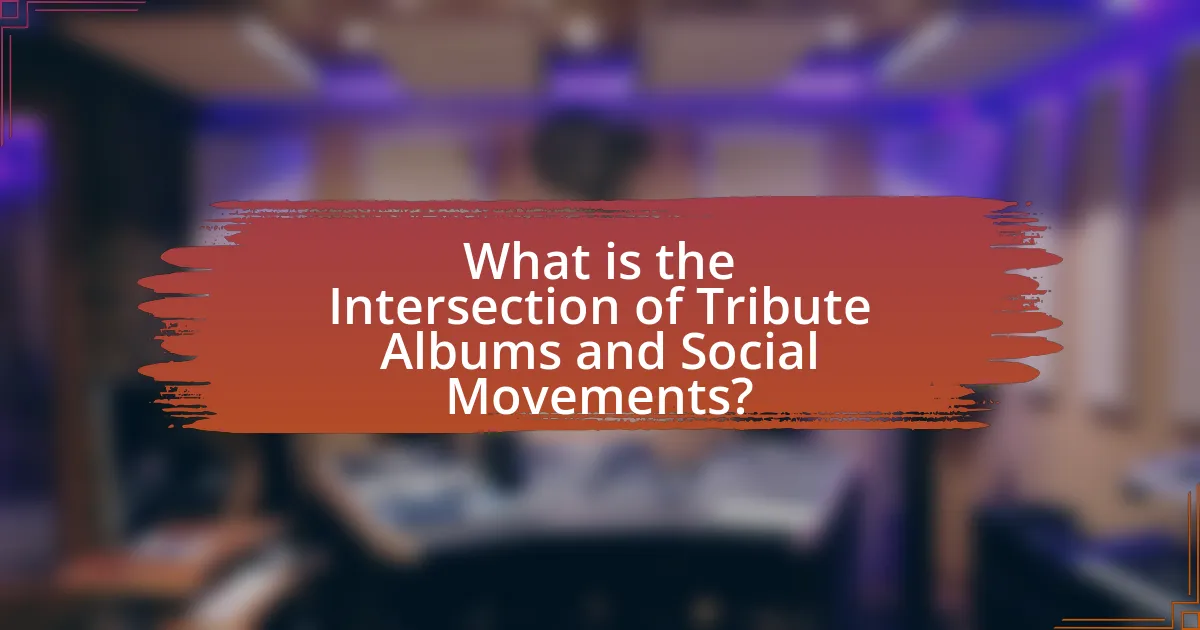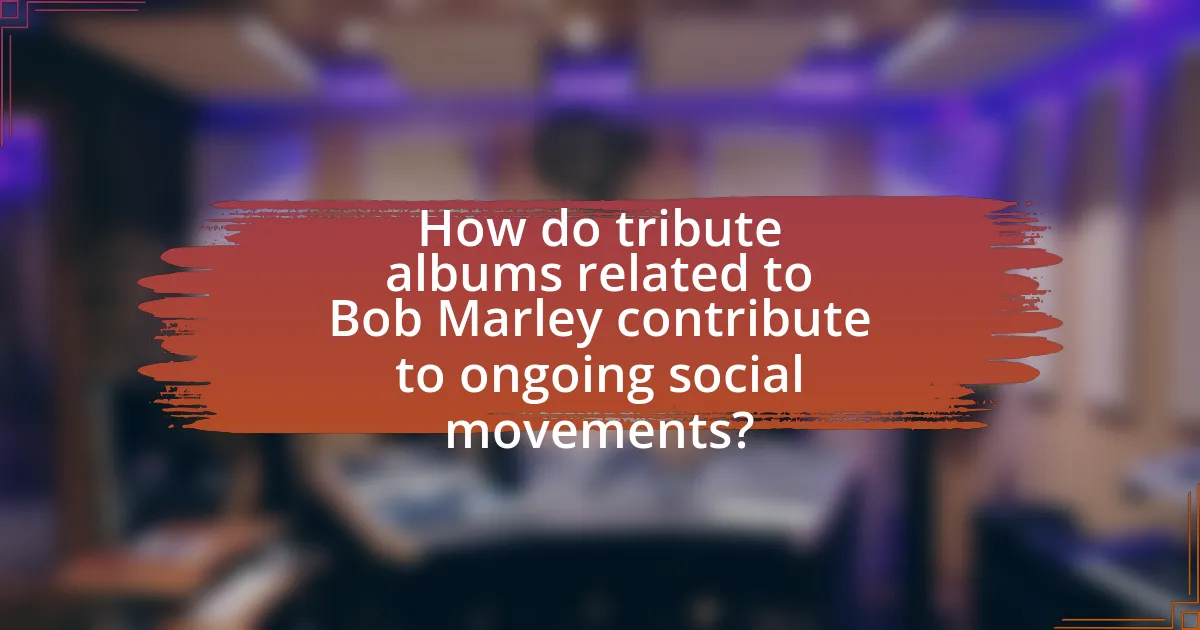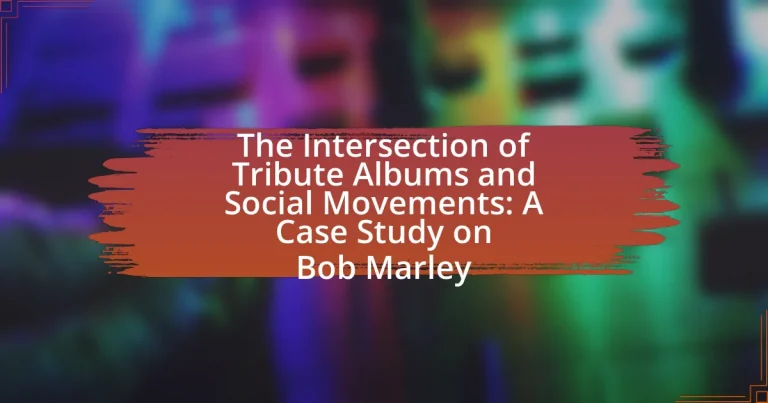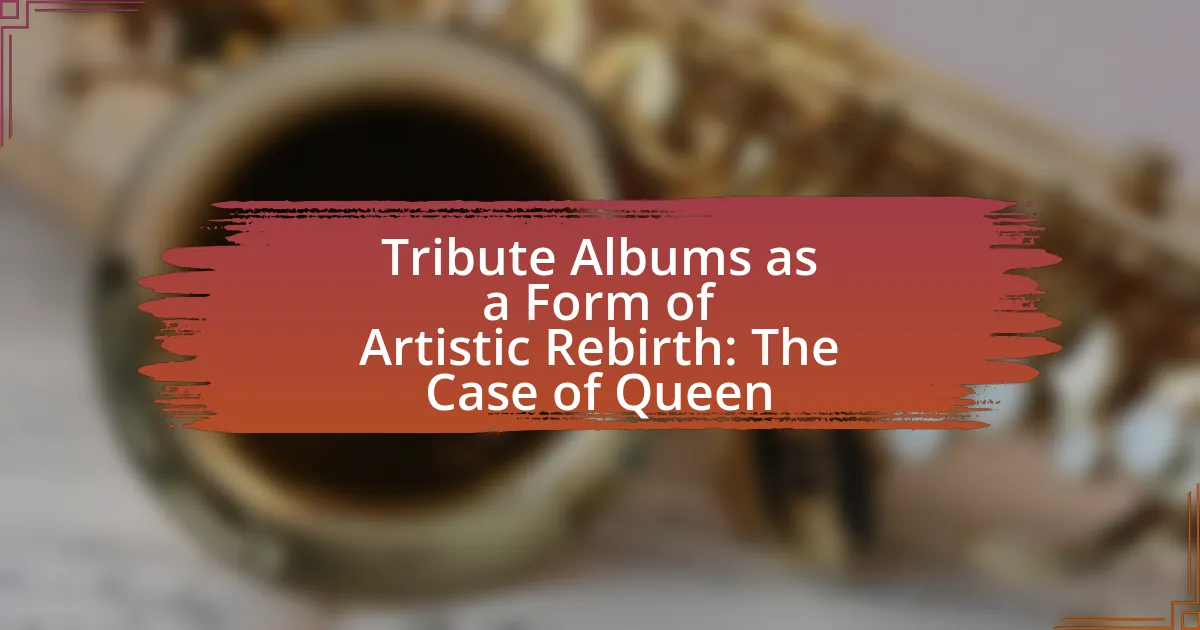The article examines the intersection of tribute albums and social movements, with a specific focus on Bob Marley as a case study. It highlights how tribute albums serve as platforms for artists to honor influential figures while addressing social issues, thereby fostering community solidarity and activism. Key themes include the historical context of tribute albums in social movements, the selection process for songs, and the significant role these albums play in raising awareness and shaping public perception of social justice. The article also discusses how Marley’s music continues to inspire contemporary movements, emphasizing the enduring relevance of his messages of resistance and unity.

What is the Intersection of Tribute Albums and Social Movements?
The intersection of tribute albums and social movements lies in their ability to amplify cultural messages and foster community solidarity. Tribute albums often serve as a platform for artists to honor influential figures while simultaneously addressing social issues, thereby mobilizing listeners around a common cause. For instance, the tribute album “Chant Down Babylon: The Island Anthology” dedicated to Bob Marley not only celebrates his musical legacy but also highlights themes of resistance and empowerment relevant to social movements, particularly those advocating for racial equality and justice. This connection is evident as tribute albums can raise awareness, generate funds for causes, and inspire activism, demonstrating their role as a catalyst for social change.
How do tribute albums reflect social movements?
Tribute albums reflect social movements by serving as a platform for artists to express solidarity with specific causes and to honor influential figures associated with those movements. For example, tribute albums dedicated to Bob Marley not only celebrate his musical legacy but also highlight themes of social justice, anti-colonialism, and human rights, which were central to his work. The album “Chant Down Babylon,” featuring various artists covering Marley’s songs, emphasizes the Rastafarian movement and its messages of resistance against oppression. This connection illustrates how tribute albums can amplify the voices of social movements, fostering awareness and encouraging activism among listeners.
What are the historical contexts of tribute albums in social movements?
Tribute albums in social movements historically serve as a means to honor influential artists while amplifying the causes they championed. For instance, the tribute album “Chimes of Freedom: The Songs of Bob Dylan Honoring 50 Years of Amnesty International,” released in 2012, highlights how music can unite people around human rights issues, reflecting Dylan’s impact on social activism. Additionally, the “We Are the World” project in 1985 exemplifies how a collective musical effort can raise awareness and funds for humanitarian crises, specifically addressing famine in Ethiopia. These albums often emerge during pivotal moments in history, leveraging the cultural significance of music to mobilize support and foster solidarity among diverse communities.
How do artists choose songs for tribute albums related to social causes?
Artists choose songs for tribute albums related to social causes by selecting tracks that resonate with the themes of the cause they aim to support. This selection process often involves considering the emotional impact of the songs, their relevance to the social issue, and the original artist’s message. For instance, tribute albums often feature songs that have historically addressed social justice, equality, or human rights, aligning with the objectives of the tribute. A notable example is the tribute album “Chimes of Freedom,” which includes Bob Dylan’s songs reinterpreted by various artists to raise awareness for human rights, demonstrating how the chosen songs reflect the overarching social message.
Why are tribute albums significant in cultural discourse?
Tribute albums are significant in cultural discourse because they serve as a means of honoring influential artists while simultaneously reflecting and shaping societal values and movements. These albums often bring together diverse artists to reinterpret the work of a celebrated figure, thereby fostering a dialogue about the artist’s impact on culture and social issues. For instance, Bob Marley’s tribute albums not only celebrate his musical legacy but also highlight themes of resistance, unity, and social justice, resonating with ongoing movements for equality and human rights. This connection between tribute albums and cultural discourse is evidenced by the way they can revitalize interest in the original artist’s messages, as seen in the resurgence of Marley’s music during contemporary social movements, which underscores the enduring relevance of his work in addressing issues like racial inequality and political oppression.
What role do tribute albums play in raising awareness for social issues?
Tribute albums play a significant role in raising awareness for social issues by leveraging the popularity of established artists to highlight specific causes. These albums often feature various artists covering songs that resonate with social movements, thereby amplifying the message and reaching a broader audience. For instance, the tribute album “Chimes of Freedom: The Songs of Bob Dylan Honoring 50 Years of Amnesty International” not only celebrated Dylan’s music but also raised funds and awareness for human rights issues, demonstrating how music can serve as a catalyst for social change. By connecting emotional narratives with social justice themes, tribute albums effectively engage listeners and inspire action.
How do tribute albums influence public perception of social movements?
Tribute albums significantly influence public perception of social movements by amplifying the messages and values associated with those movements. These albums often reinterpret and celebrate the work of artists who have been pivotal in advocating for social change, thereby reinforcing the cultural narratives surrounding those movements. For example, tribute albums dedicated to Bob Marley not only honor his musical legacy but also highlight his messages of peace, unity, and resistance against oppression, which resonate with contemporary social justice issues. This connection can lead to increased awareness and support for the movements Marley represented, as listeners engage with the music and its historical context, fostering a deeper understanding of the ongoing struggles for equality and justice.
What is Bob Marley’s influence on social movements through tribute albums?
Bob Marley significantly influenced social movements through tribute albums by amplifying messages of resistance, unity, and social justice. Tribute albums, such as “Chant Down Babylon” and “Bob Marley: The Ultimate Collection,” reinterpret his music, allowing new generations to engage with his themes of empowerment and activism. These albums often feature diverse artists who reinterpret Marley’s work, thereby expanding his reach and relevance in contemporary social issues, such as racial equality and human rights. For instance, “Chant Down Babylon” includes contributions from artists like Lauryn Hill and Steven Marley, who connect Marley’s legacy to modern struggles, demonstrating how his music continues to inspire activism and solidarity in various movements worldwide.
How has Bob Marley’s music been used in tribute albums?
Bob Marley’s music has been featured in numerous tribute albums that celebrate his influence on reggae and social movements. These tribute albums often include various artists covering his iconic songs, showcasing the enduring legacy of his messages of peace, love, and resistance. For instance, the album “Bob Marley: A Tribute to the Legend” released in 1999 features renditions of his classics by artists like Eric Clapton and Rita Marley, highlighting the cross-generational appeal of his work. Additionally, the “Songs of Freedom” compilation released in 1992 includes a mix of live performances and studio recordings, further emphasizing how his music continues to inspire new interpretations and social activism.
What themes in Bob Marley’s music resonate with social movements?
Bob Marley’s music prominently features themes of resistance, unity, and social justice, which resonate deeply with social movements. His songs often address issues such as oppression, inequality, and the struggle for freedom, exemplified in tracks like “Get Up, Stand Up” and “Redemption Song.” These songs serve as anthems for various social movements, advocating for human rights and empowerment. The historical context of Marley’s work, particularly during the civil rights movement and anti-colonial struggles, reinforces the relevance of his messages, as they inspired activism and solidarity among marginalized communities worldwide.
How have different artists interpreted Bob Marley’s work in their tributes?
Different artists have interpreted Bob Marley’s work in their tributes by infusing their unique styles while preserving the core messages of his music. For instance, artists like Lauryn Hill and John Legend have incorporated elements of soul and R&B into their renditions of Marley’s songs, emphasizing themes of love and social justice that resonate with contemporary audiences. Additionally, reggae artists such as Damian Marley and Protoje have paid homage to their roots by maintaining the original reggae sound while adding modern lyrical perspectives, thus bridging the gap between Marley’s era and current social movements. These interpretations not only celebrate Marley’s legacy but also reflect ongoing struggles for equality and unity, demonstrating the enduring relevance of his work in today’s cultural landscape.
What impact did Bob Marley have on the global perception of social justice?
Bob Marley significantly influenced the global perception of social justice through his music and activism. His songs, such as “Get Up, Stand Up” and “Redemption Song,” addressed themes of resistance against oppression, inequality, and human rights, resonating with marginalized communities worldwide. Marley’s incorporation of Rastafarian beliefs and his advocacy for Pan-Africanism further amplified his message, promoting unity and empowerment among oppressed peoples. His performances and public statements during the 1970s, particularly in the context of the political turmoil in Jamaica, highlighted the struggles against colonialism and systemic injustice, making him a symbol of hope and change. Marley’s legacy continues to inspire social justice movements globally, as his music remains a powerful tool for activism and awareness.
How did Bob Marley’s activism shape the content of tribute albums?
Bob Marley’s activism significantly influenced the content of tribute albums by emphasizing themes of social justice, unity, and resistance against oppression. His music often addressed issues such as poverty, inequality, and human rights, which inspired various artists to incorporate similar messages in their tribute works. For instance, albums like “Songs of Freedom” and “Chant Down Babylon” feature reinterpretations of Marley’s songs that highlight these social themes, reflecting his commitment to activism. This alignment with Marley’s ideals not only honors his legacy but also serves to amplify contemporary social movements, demonstrating the enduring impact of his activism on the music industry and cultural discourse.
What are notable tribute albums dedicated to Bob Marley and their significance?
Notable tribute albums dedicated to Bob Marley include “Chant Down Babylon” (1999) and “Bob Marley: The Ultimate Collection” (2001). “Chant Down Babylon” features various artists reinterpreting Marley’s songs, emphasizing his influence on contemporary music and social justice movements. This album showcases the enduring legacy of Marley’s messages of unity and resistance against oppression, aligning with the broader themes of social movements. “Bob Marley: The Ultimate Collection” compiles essential tracks that highlight Marley’s impact on reggae and global culture, reinforcing his role as a voice for the marginalized. These tribute albums serve to celebrate Marley’s contributions while inspiring new generations to engage with his ideals of peace and activism.

How do tribute albums related to Bob Marley contribute to ongoing social movements?
Tribute albums related to Bob Marley contribute to ongoing social movements by amplifying his messages of peace, unity, and resistance against oppression. These albums often feature contemporary artists who reinterpret Marley’s music, thereby introducing his themes to new audiences and contexts. For instance, the album “Chant Down Babylon” includes various artists covering Marley’s songs, which not only honors his legacy but also highlights issues such as social justice and human rights, resonating with movements like Black Lives Matter. The continued relevance of Marley’s work in these tribute albums serves to inspire activism and solidarity, reinforcing the connection between music and social change.
What lessons can be learned from Bob Marley’s tribute albums in activism?
Bob Marley’s tribute albums demonstrate the power of music as a tool for activism by amplifying social messages and fostering community engagement. These albums, such as “Chant Down Babylon,” reinterpret Marley’s work to address contemporary issues like social justice and inequality, illustrating how music can inspire collective action. The collaborations with various artists also highlight the importance of unity across diverse backgrounds in activism, reinforcing that shared artistic expression can mobilize audiences toward a common cause. Furthermore, the enduring popularity of Marley’s music in these tributes underscores the lasting impact of his messages, showing that art can transcend time and continue to resonate with new generations advocating for change.
How can tribute albums serve as tools for modern social movements?
Tribute albums can serve as tools for modern social movements by amplifying the messages and values associated with the original artists, thereby fostering awareness and solidarity around specific causes. For instance, tribute albums often feature contemporary artists who reinterpret classic songs, allowing these tracks to resonate with new audiences and contextualize social issues relevant to the present day. A notable example is the tribute album “Chimes of Freedom: The Songs of Bob Dylan Honoring 50 Years of Amnesty International,” which not only celebrated Dylan’s work but also raised funds and awareness for human rights issues, directly linking music to activism. This demonstrates how tribute albums can effectively mobilize support and inspire action within social movements.
What strategies can artists adopt when creating tribute albums for social causes?
Artists can adopt several strategies when creating tribute albums for social causes, including collaboration with diverse musicians, selecting impactful songs, and integrating educational components. Collaboration allows artists to bring together various voices and styles, enhancing the album’s reach and resonance; for instance, the “We Are the World” project featured numerous artists to amplify its message. Selecting songs that have historical or emotional significance can evoke strong responses and raise awareness about the cause, as seen in tribute albums that honor influential figures like Bob Marley, whose music often addressed social justice. Additionally, integrating educational components, such as providing information about the cause and ways to contribute, can further engage listeners and encourage action, exemplified by albums that include liner notes or digital resources linked to social movements.
What are the best practices for creating impactful tribute albums?
The best practices for creating impactful tribute albums include selecting a diverse range of artists to cover the original work, ensuring high-quality production, and maintaining the essence of the original artist’s style while allowing for creative reinterpretation. Diverse artist selection enhances the album’s appeal and reaches a broader audience, as seen in tribute albums like “The Art of McCartney,” which featured various musicians interpreting Paul McCartney’s songs. High-quality production is essential, as it reflects the respect for the original artist and their work; for instance, the “We Are the World” project showcased professional production standards that contributed to its success. Lastly, preserving the original artist’s essence while allowing for reinterpretation fosters authenticity and emotional connection, which is crucial for resonating with fans and new listeners alike, as demonstrated by the “Tribute to Bob Marley” album that honored his reggae roots while introducing contemporary sounds.




